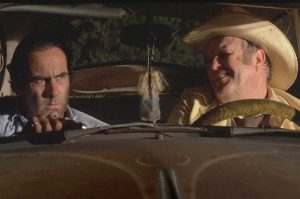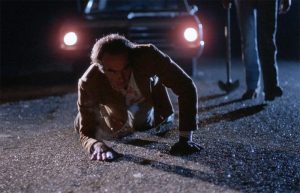
It all started in Texas. The Coens’ love affair with film noir, which sparked classics such as “Fargo,” “The Man Who Wasn’t There,” & “No Country for Old Men,” began (fittingly enough) with their first feature film, “Blood Simple.” It’s an apt title given the simplicity of the plot: a scorned husband hiring a private detective to take out his cheating wife and her lover. As with the greatest of film noirs, plans go awry and the film spirals into a descent of madness. The audience knows the culprit, but the characters do not. The tension arises from their reactions, with a few twists and turns thrown in for good measure to spice up the proceedings. It’s all told with a breakneck pace, the ninety-nine minute runtime breezing by.
“Blood Simple” was a big proponent in energizing the neo-noir craze, in which pulp thrillers would imbue characteristics of film noir. The conflicted protagonist (which paved the way for antiheroes), the difficult situation, and the usage of shadows and low-key lighting to set the mood. What separated neo-noirs was their nihilistic approach, heightening the violence and depravity of the situation(s). Most abandoned the low-key lighting in favor of a gritty visual flair; shadows playing less a factor in favor of harsh lighting and spasmodic camera angles to complement the story’s downtrodden nature. Even those that play up the film noir tendencies are still lodged in the neo-noir category simply due to their release date and affinity for violence. “Blood Simple” is one such film.

The grittiness of “Blood Simple” sets it apart from classic film noirs, but the Coens don’t shy away from the familiar elements. Joel (taking sole directing credit, sharing the screenwriting credit with his brother, Ethan) cakes the film in shadows. If it’s not the moonlight glistening on the face of Private Detective Loren Vissir (M. Emmet Walsh) as he breaks into the home of Ray (John Gertz) & Abby (Frances McDormand), it’s the neon signs draping the interiors of the bar owned by Julian Marty (Dan Hedaya). Cinematographer Barry Sonnenfeld cleverly utilizes the red neon to evoke ominous dread when Marty is cooking up the scheme and soothing blues when he believes the deed has been done. Both are blended together upon the confirmation, matching his mixed emotions. Red follows him into the bathroom as he vomits at the thought of his wife’s murder; blue welcomes him back into the bar as he breathes a sigh of relief. These colors also represent betrayal and incoming twists, none of which I’ll spoil.
The antihero, usually reserved for the private detective, is dispersed between Ray, Abby, & Marty. The private detective is arguably the villain, making snide remarks and cackling maniacally from the outset. The Coens avoid making him a caricature, instilling paranoia in his motives atop his greed. M. Emmet Walsh puts in one of his finest performances, treading the line of comically villain and nuanced PI tremendously! He chews the scenery when Vissir puts up his façade of confidence, hiding behind sleazy jokes and a slew of Russian anecdotes. This is broken down the longer the film goes: his paranoia seeping through when playing out the hit and his desperation reaching an all-time high during a sniping attempt. Facial ticks clue the audience in to when his true self is showing.

The antiheroes seem obvious on paper: Ray & Abby are the victims of Marty’s jealousy, subtle hints to his abusive ways justifying his wife’s betrayal. Those are only subtle hints from the surreptitious couple, with Marty dropping his own hints to cause the audience to question the couple’s character. Hedaya handles his ambiguity well, having his vicious side present only when pushed to his limits. There’s a sense of melancholy in his demeanor, highlighted in the way he drags his body through town following a fight or his dismissal of Ray’s presence following a previous altercation. Still, he is susceptible to violent outbursts, swaying the audience into the couple’s court.
Ray & Abby aren’t innocent souls, mind you. They did engage in an extramarital affair; Abby betraying her husband, Ray betraying his boss. This put lowly bartender Meurice (Samm-Art Williams) in the middle of a nasty situation, his calm approach to it all making him the true hero. The way in which both Ray and Abby handle themselves upon certain revelations insinuates ulterior motives and questionable tactics. At one point, Ray makes a few fatal mistakes that had me questioning the character’s intelligence, believing his actions to be the result of poor writing. The Coens were way ahead of me, vindicating questionable characterizations and motives.

For a first-time effort, the Coens were phenomenally on point! The characterizations were layered, the performances excellent, the cinematography exquisite, and the score (credited to Carter Burwell) scintillating! Their defining quirks were being ironed out here, such as their affection for peppy dialogue. At times the dialogue comes across as stilted, especially in the communication between Ray & Abby. It’s excusable as foreshadowing and in highlighting their troubled relationship, but also dissipates some of their chemistry. Their visuals are vibrant, albeit too indulgent at times. The atmosphere is intense, the never-ending desert landscapes adding dread not found in most film noirs (seeing as how most are set in big cities). Even so, the Texas locale could’ve been played up more. Most of the action is confined in the bar, the suburbs, and the city, not taking full advantage of the state’s identity. The Coens make up for that by ingraining the film with a southern twang.
These minor grievances are forgivable for a first-time effort, especially one that is as ripe as this! The attention to detail is unparalleled, found in seasoned vets, not beginners. It is rare for a filmmaker to feel like an auteur in their first outing, yet Joel Coen does just that here. It comes as no surprise in watching “Blood Simple” that these two brothers would go on to become heralded giants in the film industry. Many predicted it in back in 1985; their premonition ringing true. And it all started in Texas.
Final Rating: A-
